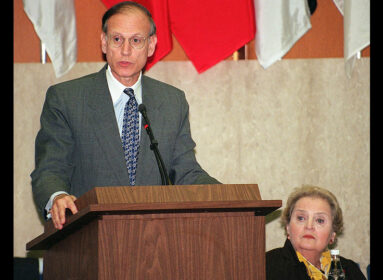A View From Afar
By Rabbi Avi Shafran
To name the Muslim country where she lives would compromise her security; the authorities there do not look favorably on citizens who communicate with Jews. Her husband is a Hindu and she, although born a Christian, long ago abandoned her family’s religion and pledged herself to the Torah.
“Tehilla,” however, as I’ll call her, has not converted, and has no plans to convert. She and her two adult sons are “Noahides” – non-Jews who have come to the conclusion that the Jewish religious tradition is true and who have undertaken observance of the “seven laws of the children of Noah” – the basic moral precepts that Judaism prescribes for all of humanity: the prohibitions against idolatry, profaning G-d’s name, murder, sexual immorality, stealing and eating a limb cut from a live animal, as well as the commandment to establish courts of law.
There are Noahides in Australia, Asia, Europe and here in the United States (a good number of them, for some reason, in Tennessee, Georgia and Texas). Many face formidable societal obstacles, though Tehilla, considering where she lives, likely faces more than most.
“Tehilla,” which means “praise” in Hebrew, is an appropriate alias for someone so filled with admiration for the Jewish people. Her studies of Judaism over years, by internet and e-mail, and her interaction with various rabbis around the world, have endeared the Jewish people and the Jewish religion to her – and endeared her to her mentors. Jews, to be sure, are enjoined from proselytizing to non-Jews, but Tehilla is self-motivated (an understatement); those, like me, who correspond with her are simply answering her queries – and being inspired by her observations, rendered in fluent English.
Her empathy for Jews, especially in Israel, is deep. And it is accompanied by a clarity of vision that eludes so many, and so much of the media. “With all the sufferings [the world has] inflicted on you all,” she writes, “I still cannot fathom how magnanimous you all are in being a light to all nations.”
“After meeting your people [by e-mail],” she once wrote, “I cannot understand how such a warm, compassionate and humane people can be so persecuted and so misunderstood.”
And, from other e-mails:
“One thing the mighty nations are not absorbing is history. Even if they don’t believe the Scriptures per se, history itself is proof enough that your nation’s survival is the living and continuous miracle personally brought about by G-d.”
“G-d will never allow you to fall, in the merit of your patriarchs and prophets… soon G-d is going to say ‘enough’ to your tears…”
“All I can pray is when Hashem decides it’s time for all your sufferings to be over, He will show us Gentiles the compassion we failed to show you all.”
Tehilla is not only an observer of history and the world around her but an example of commitment to self-betterment on a personal level. She keeps a picture of the Chofetz Chaim, the saintly scholar who died shortly before the Holocaust and who wrote definitive works on the laws of proper speech. She has studied his works because, as she once explained, “…when I am angry I speak without thinking. The Chofetz Chaim has really changed my life and I am really trying to live up to his guidance.”
She is a charitable woman as well, and personally cared for a dying relative by marriage who had for years ridiculed her for her choices.
“My sons and I are… trying our best to do our part for the needy,” she once explained.
And she looks forward to the Messiah’s arrival with eagerness: “The greatest blessing for believing Gentiles like us is to be able to live where we can study … without fear, and acknowledge Hashem as the supreme G-d and you all as His chosen.”
In fact, Tehilla’s dedication to our people and our faith can sometimes sting, forcing her readers to recognize their own imperfect appreciation of their wonderful lot in life as Jews.
“It’s sad,” she once wrote, “that some of your people do not seem to understand or realize the special and holy heritage given to them for eternity, not something they can disown…”
Tehilla worries about her adult sons finding proper wives – who will share her and her sons’ outlook on life. She has also suffered a number of serious medical crises. Even her reaction to that challenge, though, stands as a valuable and true lesson.
“You see, rabbi,” she recently wrote, “I know G-d is so kind and I am making atonement for my sins… sickness takes away a lot of sins…”
That idea may make some of us squirm. But the fact that adversity and pain can be atonements is a quintessentially Jewish concept, readily gleaned from the Talmud and, in these waning weeks before the Days of Judgment – when examining one’s spiritual state can yield deep discomfort of its own – a timely one.
May Tehilla’s lessons, and her example, be a merit for her good health – and for seeing her sons find their life-partners soon.
Rabbi Shafran is director of public affairs for Agudath Israel of America.
(c) 2010 AM ECHAD RESOURCES








 Southern New England Jewish Ledger
Southern New England Jewish Ledger













Comments are closed.